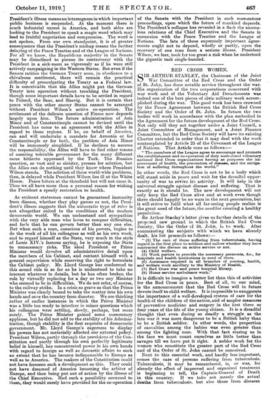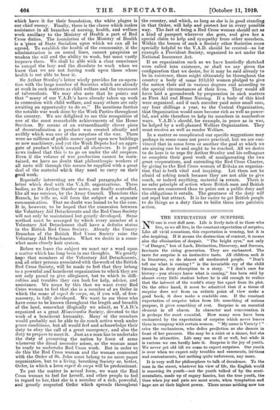RED CROSS WOMEN.
SIR ARTHUR STANLEY, the Chairman of the Joint War Committee of the Red Cross and the Order of St. John, has done notable service throughout the war. His organization of the two corporations concerned with war work and of the Voluntary Aid Detachments was indeed one of the best pieces of civic military work accom- plished during the war. This good work has been crowned by the Peace Agreement between the British Red Cross Society and the Order of St. John. In future the two bodies will work in accordance with the plan embodied in the Agreement for the future development of the Red Cross. Not only will they act together under a Joint Council, a Joint Committee of Management, and a Joint Finance Committee, but the Red Cross Society will have its existing Charter extended in order that it may deal with the work contemplated by Article 25 of the Covenant of the League of Nations. That Article runs as follows :— " The members of the League agree to encourage and promote the establishment and co-operation of duly authorized voluntary national Red Cross organizations having as purposes the im- provement of health, the prevention of disease, and the mitiga- tion of suffering throughout the world."
In other words, the Red Cross is not to be a body which will stand aside in peace and wait for the dreadful oppor- tunity of war to revive its activity. It will help in the universal struggle against disease and suffering. That is exactly as it should be. The new development will not only keep the Red Cross alive and at work even though there should happily be no wars in the next generation, but it will strive to fulfil what all far-seeing people realize is the great need of the future, the need for creating a healthy population. Sir Arthur Stanley's letter gives us further details of the proposed new ground in which the British Red Cross Society, like the Order of St. John, is to work. After enumerating the subjects with which we have already dealt, his list proceeds as follows:- " (3) The care of those suffering from tuberculosis,• having regard in the first place to soldiers and sailors whether they have contracted the disease on active service or not.
(4) Child welfare. (5) Work parties to provide• the necessary garments, &c., for hospitals and health institutions in need of them. (6) Assistance required in all branches of nursing, health, and welfare work ancillary to the Ministry of Health.
(7) Red Cross war and peace hospital library. (8) Home service ambulance work."
It is difficult to imagine a better list than this of activities for the Red Cross in peace. Best of all, to our mind, is the.announcement that the Red Cross will in future devote itself to child welfare. It is impossible to exaggerate the importance of a well-developed system of care for the health of the children of the nation, and of ampler measures bf preventive medicine and surgery in the first three or four years of the life of the young citizen. It is a dreadful thought that even during so deadly a struggle as the late war it was more dangerous to be a British baby than to be a British soldier. In other words, the proportion of casualties among the babies was even greater than among the fighting men. With that fact staring us in the face we must count ourselves as little better than savages till we have put it right. A nobler work for the women who constitute the greater part of the Red Cross and of the Order of St. John cannot be conceived.
Next to this essential work, and hardly less important, comes the care of persons suffering from tuberculosis. Tuberculosis, it may be remembered, is, or was, for already the effect of improved and organized treatment is beginning to tell, the Captain-General of Death in this country. If we take not merely the actual deaths from tuberculosis. but also those from diseases which have it for their foundation, the white, plague' is our chief enemy. Finally, there is the clause which makes assistance in all branches of nursing, health, and welfare work ancillary to the Ministry of Health a part of Red Cross duties. The foundation of the Ministry of Health is a 'piece of State Socialism upon which we can all be aereed. To establish the health of the community, if the administration is on sound lines, cannot pauperize or weaken the will and the ability to work, but must vastly improve them. We shall be able with a clear conscience to compel the lazy and the dissolute to work when we know that we are not forcing work upon those whose health is not able to bear it.
Sir Arthur Stanley's letter wisely provides for co-opera- tion with the large number of Societies which are already at work in such matters as child welfare and the treatment of tuberculosis. We may also note that he points out that " many of our V.A.D.'s have already taken up work in connexion with child welfare, and many others are only awaiting an opportunity to do so." He mentions further the notable war work done by the Work Parties throughout the country. We are delighted to see this recognition of one of the most remarkable achievements of the Home Services. By means of an extraordinarily clever piece of decentralization a product was created silently and swiftly which was one of the surprises of the war. There were no millions of public money spent upon new buildings or new machinery, and yet the Work Depots had an aggre- gate of product which amazed all observers. It is good news indeed that this is to go on under the old auspices. Even if the volume of war production cannot be main- tained, we have no doubt that philanthropic workers of all sorts will through this means be supplied with a great deal of the material which they need to carry on their good work.
Especially interesting are the final paragraphs of the letter which deal with the V.A.D. organizations. These bodies, as Sir Arthur Stanley notes, are finally controlled, like all war services, by the Army Council. Therefore this Branch, he tells us, will form the subject of a separate communication. That no doubt was bound to be the case. It is, however, to be hoped that the connexion between the Voluitary Aid Detachments and the Red Cross Society will not only be maintained but greatly developed. Some method must be arranged by which every member of a Voluntary Aid Detachment shall have a definite status in the British Red Cross Society. Already the County Branches of the British Red Cross Society raise the Voluntary Aid Detachments. What we desire is a some- what more closely knit system.
Before we leave the subject we must say a word upon a matter which has long been in our thoughts. We greatly hops that members of the Voluntary Aid Detachments, and all other persons associated with the work of the British Red Cross Society, will be made to feel that they belong to a powerful and beneficent organization to which they are not only proud to give allegiance, but to which in diffi- culties and troubles they can look for help, advice, and assistance. We mean by this that we want every Red Cross woman to feel that she is a member of an Order in which the sense of esprit de corps, or, if you will, of free- masonry, is fully developed. We want to see those who have come to be known throughout the length and breadth of the land, somewhat illogically we admit, as V.A.D.'s organized as a great Misericordia Society, devoted to the work of a beneficent humanity. Many of the members would probably not be able to do much active work under peace conditions, but all would feel and acknowledge their duty to obey the call of a great emergency, and also the duty to prepare to meet it. Just as a man has to undertake the duty of preserving the nation by force of arms whenever the dread necessity arises, so the woman must be ready to undertake Red Cross work. But in order to do this the Red Cross woman and the woman connected with the Order of St. John must belong to no mere paper organization, but to a living, breathing Society or, better, Order, in which a keen esprit de corps will be predominant.
To put the matter in actual form, we want the Red Cross woman to feel for herself, and other people to feel in regard to her, that she is a member of a rich, powerful, and greatly respected Order which spreads throughout the country, and which, as long as she is in good standing in that Order, will help and protect her in every possible way. The fact of being a Red Cross woman should act as a kind, of passport wherever she goes, and give her a special claim to help and sympathy from other members. Within the bosom of such a Society other Societies more specially helpful to the V.A.D. should be created—as for example a Provident Society, organized to act under the National Insurance Act.
If an organization such as we have hurriedly sketched were called into existence, or shall we say given the configuration that we desire, for it may be said already to be in existence, there might ultimately be throughout the country a body of some 103,030 women pledged to give the nation their aid in various degrees and according to the special circumstances of their lives. They would all have laid a groundwork by preparation in such matters as First Aid and Home Nursing. If a body of this kind were organized, and if each member paid some small sum, say four shillings a year, to the Central Organization, that Organization would soon become rich as well as power- ful, and able therefore to help its members in numberless ways. V.A.D.'s should, for example, in peace as in war, be helped by a well-planned Welfare Organization. They must receive as well as render Welfare.
In a matter so complicated our specific suggestions may perhaps in some cases not prove practical, but we are con- vinced that in some form or another the goal at which we are aiming can be and ought to be reached. All we desire to do here is to urge Sir Arthur Stanley and his colleagues to complete their good work of amalgamating the two great corporations, and extending the Red Cross Charter, by giving to the Red Cross woman of Britain an organiza- tion that is both vital and inspiring. Let them not be afraid of asking much because they are not able to give much, or indeed anything, material ha return. There is no safer principle of action where British men and British women are concerned than to point out a public duty and the obligations it entails. The greatness of the duty will not repel but attract. It is far easier to get British people to do things as a duty than to bribe them into patriotic action.



































 Previous page
Previous page